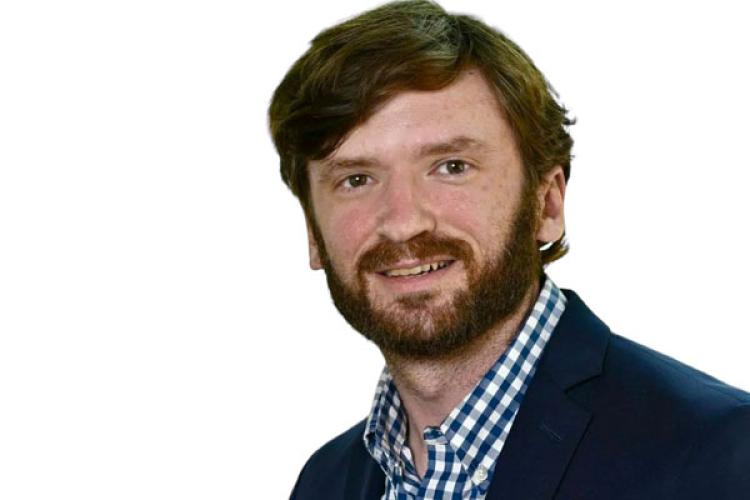
Kyle Balzer joins American Enterprise Institute as Jeane Kirkpatrick Fellow

Ohio University alumnus Kyle Balzer has started his new position as a Jeane Kirkpatrick Fellow at the American Enterprise Institute.
Balzer, who earned a Ph.D. in History in 2022, held a postdoctoral fellowship at the Clements Center for National Security at the University of Texas in 2022-23 and recently published a chapter on “US military diplomacy and the imperial state of Iran” in Boots and Suits: Historical Cases and Contemporary Lessons in Military Diplomacy as well as an article on Cold War nuclear strategy in The Strategy Bridge.
At the American Enterprise Institute, Balzer, who was the 2021-22 Baker Peace Fellow at OHIO, will work on questions of long-term strategic competition and U.S. grand strategy, as well as his forthcoming book "The Revivalists: James Schlesinger, the Competitive Nuclear Strategists, and the Rebirth of Cold War American Deterrence."
How did his time at OHIO and the History Ph.D. and work in the Contemporary History Institute set him on his current career path at the intersection of history and policy?
Q&A with Kyle Balzer
Q: In what ways are you drawing on your OHIO degree today?
A: I continue to draw from seminars, discussions and coursework that helped me develop a historical sensibility. I think this outlook, or approach, can inform how the present is analogous and different from the past, which helps with diagnosing issues. At the American Enterprise Institute, this perspective informs my work on nuclear strategy and policy—specifically, examining the deterrence requirements in a multi-sided nuclear system. And, as I continue to turn my dissertation into a book, I draw on my past discussions with OHIO mentors and friends.
Q: What classes and/or professors shaped your studies and your research? Did you start out with a clear idea for a dissertation, or did it evolve from your coursework and exam preparations?
A: I arrived in graduate school interested in strategy and policy—and quickly realized I knew very little about strategy and policy. Thankfully, my seminars and courses with Ingo Trauschweizer and John Brobst redressed this deficiency. Due to my interests, Professor Brobst suggested I look into James Schlesinger. From there, Professor Trauschweizer sharpened my thinking on the relationship between the policy of containment and nuclear strategy. I started to think of nuclear deterrence as less of a reactive, negative enterprise and more of a forward-leaning, competitive peacetime strategy. Professor Paul Milazzo encouraged me to dive deeper into Schlesinger’s time as a Schumpeter student. This revealed an interesting connection between the Schumpeterian notion of long-term, dynamic competition and Schlesinger’s strategic approach.
Beyond the dissertation, Professor Chester Pach’s research seminar was a tremendous introduction to the historian’s craft.
Q: Do you keep in touch with any of your faculty?
A: Yes. I run many ideas by them, and they always make them better. And I still have my notes from lectures and seminars. I often turn back to my Vietnam War, Afghan Wars/Great Game, and post-1945 U.S. lecture notes.
Q: What was your ah-ha moment at OHIO—that point where you said to yourself, “I’ve got this!”?
A: I’m not sure if I ever had a “ah-ha” moment. I always had a healthy skepticism. I am still skeptical and working to improve as a historian. But I was encouraged when my comprehensive exam shifted from a flurry of questions into more of a conversation. That was fun and felt rewarding.
Q: What was the hardest hill you had to climb (not counting Jeff Hill) at OHIO? And how did you overcome challenges or obstacles in your path?
A: Researching and writing a dissertation during the pandemic was tricky. But I stuck with it—probably because of the great mentorship and support from the History Department, Contemporary History Institute, and friends. My dissertation improved dramatically after each chapter draft Professor Trauschweizer critiqued. And conversations with Professor Brobst and Adam Givens (2019 OHIO History Ph.D. and now at RAND) encouraged me to have confidence in my argument and stay the course.
Q: What are your favorite OHIO memories?
A: I had a great experience working with the professors and several wonderful graduate cohorts. I’m proud to have done my graduate work at OU and the Contemporary History Institute. Trips to O’Betty’s and Jackie O’s were highlights.
Q: What’s the one thing you would tell a new OHIO graduate student not to miss?
A: I’d encourage them to seek out the senior students, as well as students from newer cohorts. I learned a great deal from both, in terms of research and navigating graduate school. Read everything you can—grad school is your final opportunity to dedicate a significant amount of time to reading.
